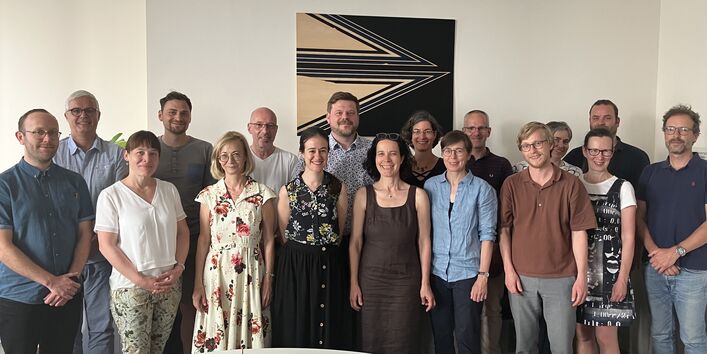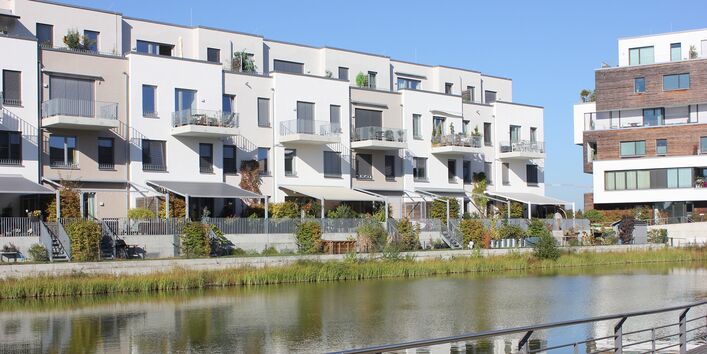Research Project AdNEB I „Advancing the New European Bauhaus”
Advancing the New European Bauhaus: Sustainable Mobility and Resilient Urban Spaces for a Better Quality of Life (AdNEB)” is an UBA in-house research project. It aims to develop recommendations for climate resilient, healthy, climate and environmentally friendly urban spaces with high quality living for all. Since 2024 UBA is an official friend of the EU’s “New European Bauhaus” initiative.
Backgrounds and Aims
The AdNEB I project “Advancing the New European Bauhaus: Sustainable Mobility and Resilient Urban Spaces for a Better Quality of Life” is an in-house research project of the German Environment Agency (UBA) inspired by the European Commission's New European Bauhaus (NEB) initiative. This initiative aims for the transformation of construction methods and the existing building stock in Europe to achieve climate-neutrality by 2050. The New European Bauhaus wants to establish a creative meeting place where future ways of life can be ecologically designed while incorporating art, culture, social inclusion, science and technology in an inclusive manner. Central to the initiative is the question of where and how we will live in the future. How will it be possible to develop urban spaces to be ecologically sustainable, socially inclusive, health-promoting and desirable places to live? The EU initiative sets a focus on built structures and related questions such as the transformation of existing structures, sustainable construction materials and energy efficiency.
AdNEB provides a conceptual, methodical and interdisciplinary contribution to the idea of the New European Bauhaus. For this, the current focus of the NEB on construction in urban areas is expanded to additional dimensions such as green and open spaces, health and well-being, climate change adaptation, environmental justice and active and sustainable mobility. The project specifically examines how we can deal with pertinent challenges in order to adapt urban spaces to improve the quality of life.
The project:
- evaluates data on health and the living environment in Germany with particular focus on social disparities,
- addresses the multifunctional built and landscape structures and their potential for climate adaptation,
- examines the effects of the coronavirus pandemic on inner cities and open spaces,
- examines opportunities of sustainable mobility to benefit from experimental governance in the shape of street experiments ("Verkehrsversuche") and
- analyses barriers and drivers for sustainable building refurbishments and develops solutions
The aim of AdNEB is to contribute to the socio-ecological transformation of cities by bringing together the numerous research strands of the German Environment Agency on these overarching issues. As a result, the project should contribute to the creative interdisciplinary NEB initiative on a European level and thereby show pathways to an appealing common ecological future.
Work programme
The AdNEB I project runs from March 2022 to September 2025. The work is divided into five work packages (WP):
WP 1 undergirds the NEB through the concept of “triple inner urban development”, which implies the connection of construction-oriented inner urban development with the future improvement and expansion of green spaces and transport transformation. At the same time, additional perspectives on sustainable urban development play a role, including insights gained from the spatial challenges experienced during the coronavirus pandemic.
WP 2 focuses on relevant research on resilient, sustainable and health-promoting urban development. This considers a specific focus on environmental justice in urban settings, on the health-promoting aspects of active mobility and on climate adaptation strategies, including the concept of the sponge city.
WP 3 analyses the role of experimental governance in transforming urban mobility. It looks at the barriers and goals as well as the impact mechanisms of street experiments ("Verkehrsversuche") in several German case studies.
WP 4 focuses on the core theme of the NEB: construction, with a particular emphasis on building refurbishments as the most sustainable strategy for preserving and creating housing. The project identifies barriers and drivers among key stakeholders such as architects, civil engineers, and housing companies, and develops solutions for policymakers and industry.
WP 5 serves as a cross-thematic synthesis by bringing together the various objectives and thematic strands of the project and formulating conclusions and supporting decision-making for the transformation of urban spaces. This work package supports the attainment of climate neutrality, a high quality of life and adaptable, healthy and resilient structures.
Associated content

From top left: Mario Kahl (bdla), Jan-Peter Glock, Achim Daschkeit, André Conrad, Katja Becken, Stephan Bartke, Katrin Dziekan, Alexander Schülke (BMUV),
(bottom) Karl Eckert, Alice Schröder, Catrin Schmidt (TUD), Sarah DeTroy, Miriam Dross, Christiane Bunge, Valentin Meilinger, Outi Ilvonen, Matthias Rudolph (abk Stuttgart)
Links
Publications
Documents
- AdNEB I products and presentations list (332.17 kB)
- Flyer of the In-house Research Project AdNEB I (933.05 kB)
- Presentation @UBA: AdNEB I - Fachbereichsübergreifende Eigenforschung am UBA (7.74 MB)
- Presentation @ISES: AdNEB I for Environmental Health ... (2.01 MB)
- Presentation @Kick-Off: Introduction of flagship project AdNEB I (1.26 MB)

